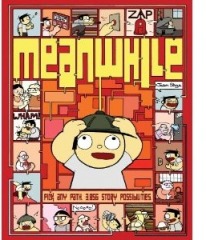
I commented on the absence of minorities in GET LAMP, but forgot the brief interview with the one person I actually recognized: Asian-American cartoonist Jason Shiga.
Jason talked about children enjoying CYOA books because they don't get many choices in real life, and there's definitely a child-like exploration and fantasy to many of his works — as well as a vindictive and violent hand of Fate. Also, Jason has a mathematics degree from UC Berkeley, and his mathemagical brain clearly informs the different formats of his interactive comics.
I consider Meanwhile his magnum opus so far. You can read a black-and-white online version of it at his site. I bought the original xeroxed and hand-cut version, but you can apparently only get the commercial full-color print version from Amazon.com now, which I haven't seen. He also created a giant poster of it.
Meanwhile is a brilliant interactive use of the spatial medium of comics — instead of necessarily reading left-right, top-bottom, you follow tubes between panels, which sometimes branch at choices, and often lead off the page on to a tab which you must flip to. The first choice is between vanilla or chocolate ice cream, but you quickly realize that Shiga is able to transcend the CYOA medium with ironically mirrored events, unsettling discoveries, and a story that explains quantum physics even as the tube structure mimics the concepts presented. Here's Jason with a brief explanation of his book:
Jason talked about children enjoying CYOA books because they don't get many choices in real life, and there's definitely a child-like exploration and fantasy to many of his works — as well as a vindictive and violent hand of Fate. Also, Jason has a mathematics degree from UC Berkeley, and his mathemagical brain clearly informs the different formats of his interactive comics.
I consider Meanwhile his magnum opus so far. You can read a black-and-white online version of it at his site. I bought the original xeroxed and hand-cut version, but you can apparently only get the commercial full-color print version from Amazon.com now, which I haven't seen. He also created a giant poster of it.
Meanwhile is a brilliant interactive use of the spatial medium of comics — instead of necessarily reading left-right, top-bottom, you follow tubes between panels, which sometimes branch at choices, and often lead off the page on to a tab which you must flip to. The first choice is between vanilla or chocolate ice cream, but you quickly realize that Shiga is able to transcend the CYOA medium with ironically mirrored events, unsettling discoveries, and a story that explains quantum physics even as the tube structure mimics the concepts presented. Here's Jason with a brief explanation of his book:
Check out Jason's site, shigabooks.com, to see online versions of some of his comics. I recommend his interactive The Last Supper, The Bum's Rush, and April Fooled, and his more traditional Bookhunter and Fleep. Unfortunately, another of his full-length interactive works, Knock, Knock, isn't even mentioned (apparently out of print). It's incredibly ambitious: the main character is trapped by a killer in a room full of objects to be interacted with in any order, and all the possible three-choice sequences are drawn out — but only one leads him outside to safety and the shocking reveal.
Here's a video review if you want to see more of Meanwhile. And a 2004 video interview that shows more of his work. If all this makes you want to make your own interactive comic, Jason explains how to fold a short branching booklet (and demonstrates a few of his comics):
Here's a video review if you want to see more of Meanwhile. And a 2004 video interview that shows more of his work. If all this makes you want to make your own interactive comic, Jason explains how to fold a short branching booklet (and demonstrates a few of his comics):
And for those who dislike CYOA books because they don't track variables, Jason has Hello, World, a "programmable" comic that tracks inventory choices in a split layer of the book:
 RSS Feed
RSS Feed